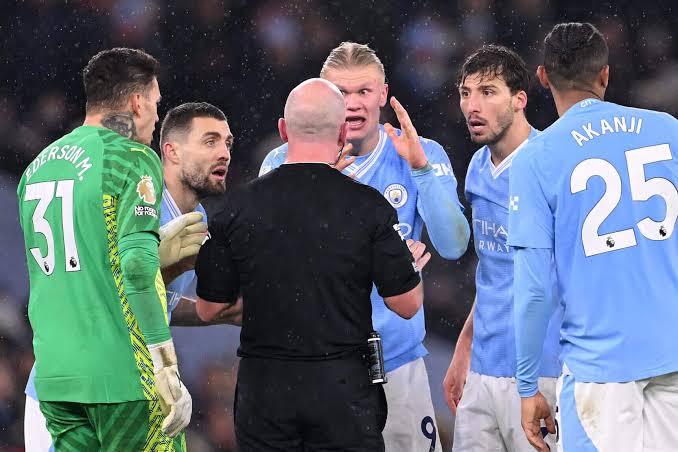New EPL season, same officiating: Addressing VAR controversy

Manchester City players laying complaints to match referee for a VAR call in last season fixture. Photo Credit- The New York Times
The 2025/26 Premier League season kicked off with its usual blend of drama, excitement, and, predictably, controversy. As fans filled stadiums and pubs across the globe, the spotlight wasn’t just on the players but on the officials and their technological sidekick: the Video Assistant Referee (VAR). The opening weekend, spanning August 15-18, 2025, saw VAR decisions dominate headlines, overshadowing stellar debuts and thrilling matches. While the introduction of semi-automated offside technology (SAOT) and in-stadium VAR announcements promised a smoother, more transparent season, the reality was a mixed bag of frustration, inconsistency, and debate. This piece is set to criticize the VAR controversies from the opening weekend, examines their impact, and proposes recommendations to restore trust in the system.
From Bournemouth call for a penalty been denied in their match against Liverpool to Manchester United call for Arsenal’s goal to be cancelled. These incidents show deeper issues with VAR’s implementation. First, the promise of SAOT to streamline offside calls has been partially fulfilled, but it hasn’t eliminated subjectivity in other decisions like penalties or red cards.
RELATED STORIES
Michael Oliver Biggest Controversial Officiating in 2024/25 EPL Season
Opinion: Has VAR done more harm than good in football?
The technology’s precision in offside rulings, while impressive, often feels like an overreach when margins are razor-thin, making fans who value the game’s flow prefer forensic accuracy. Second, the new in-stadium announcements, while a step toward transparency, lack depth. Fans hear the outcome but not the reasoning, leaving them to speculate or turn to social media for clarity. Third, the data suggests a potential bias: top clubs like Liverpool and Arsenal often benefit from marginal calls, while smaller sides like Crystal Palace struggle.
The psychological impact on players and fans is also significant. The lengthy pauses for VAR checks disrupt momentum, and the uncertainty breeds doubts. The introduction of referee-worn cameras, trialed at the 2025 FIFA Club World Cup, is under consideration for the Premier League, but without clear guidelines on their use, they risk becoming another gimmick rather than a solution.
However, it is not enough to complain and wail at every incorrect decision made either by the on-field referee or the VAR, but to seek ways in resolving this issue that has become a thorn on the flesh of the sport. To address these issues, the Premier League must balance technology’s benefits with the game’s human element. While SAOT’s precision is commendable, offside calls should consider the “daylight” rule or a margin of error for negligible infringements. This would prioritize the spirit of the game over little accuracy, reducing controversies. The International Football Association Board (IFAB) could trial this in lower-stakes competitions first.
In-stadium VAR announcements must go beyond stating the decision. Referees should provide a brief explanation of the reasoning, perhaps via a pre-recorded template for common scenarios. This would align with the trial of referee-worn cameras, which could show fans the referee’s perspective without airing confrontational moments. Again, borrowing from sports like tennis, each team could be given one or two VAR challenges per match to contest decisions like penalties or red cards. This would empower managers and players, reduce the perception of referee bias, and limit VAR’s overreach to moments deemed critical by the teams themselves.
RELATED STORIES
Haaland vs Maghalaes: Biggest Player Rivalries in EPL this Season
EPL’s halftime interview fiasco: Going too far in football’s commercialization
Finally, establishing an independent panel to review VAR decisions post-match, focusing on consistency across games. This panel could publish weekly reports detailing the rationale behind controversial calls, addressing fan concerns about bias toward bigger clubs. Data from the opening weekend suggests penalties are awarded at a higher rate than the seasonal average (one every 3.2 games vs. 4), and transparency could curb this trend.
Final take
The opening weekend of the 2025/26 Premier League season was a microcosm of VAR’s potential and pitfalls. Moments of brilliance from players like Ekitike, Mbeumo, and Salah were overshadowed by debates over pictures, lines, and whistles. While SAOT and in-stadium announcements are steps forward, they’re not enough to quell the growing discontent. Football thrives on passion, not precision, and the Premier League must act swiftly to ensure VAR enhances rather than detracts from the beautiful game. By refining technology, improving communication, empowering teams, and ensuring accountability, the league can turn cries into cheers or at least let the football do the talking. Until then, the bar for VAR remains frustratingly low.

